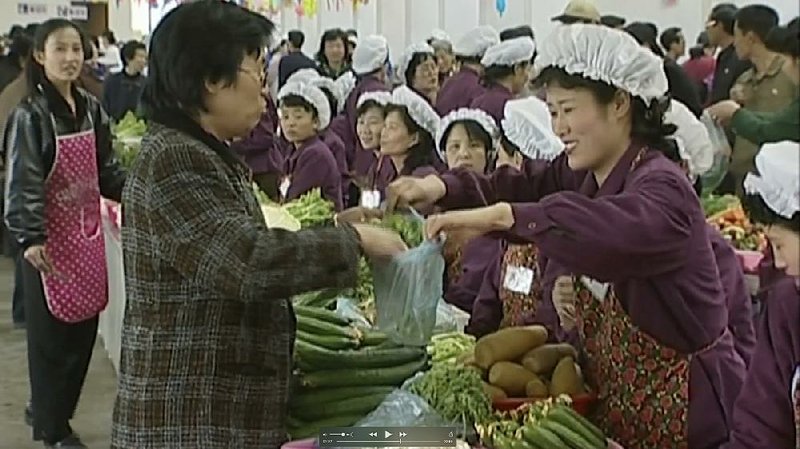SEOUL, South Korea -- Hundreds of markets, each with thousands of stalls, form the glue that holds North Korea's socialist planned economy together, say defectors who once sold medicinal herbs, jeans, TV sets, foreign dramas on video CDs, and other goods to make a living.
"People there say North Korean markets have everything except for a cat's horn. They truly have everything there," said Cha Ri-hyuk, 31, who defected to South Korea in 2013. "If North Korea shuts down the markets, it will collapse, too."
North Korea has tolerated -- and taxed -- some market activities since the country's state rationing systems crumbled in the mid-1990s during an economic crisis and famine that was estimated to have killed hundreds of thousands of people. The economic boost the markets provide has helped leader Kim Jong Un keep a grip on power and further his nuclear ambitions, leaving the North's political system and human-rights abuses largely untouched.
But some political analysts note that market activities are gradually infusing North Koreans with new ways of thinking that eventually could loosen the authoritarian government's hold over its 24 million people.
"It's like North Korea has so far allowed markets that it can control," said Lim Eul Chul, a North Korea expert at South Korea's Kyungnam University. "But materialism, individualism and the idea of pursuits of profits are taking root in the minds of ordinary people."
Satellite photos and testimonies of defectors show there are now about 400 big, mostly outdoor markets, called "jangmadang," in the North. Items sold there are locally produced, or imported or smuggled from countries including China, South Korea and Japan.
Recent surveys of refugees suggest many ordinary North Koreans have turned to market activities because the country's public rationing systems have never been fully restored. Four defectors who talked to The Associated Press said they received no rations at all.
The nascent consumer economy has led to the emergence of a new class of wealthy people called "donju" -- "masters of money." They usually start at markets and invest their savings in larger ventures that state authorities struggle to finance -- such as apartment construction, taxi operations and mining works.
North Korea periodically tried to prevent markets and donjus from growing too rapidly by restricting operating hours, barring people under 40 from working at markets and banning use of foreign currency there. But such measures often were circumvented and later withdrawn, according to Seoul-based North Korea monitoring groups that claim networks of contacts inside North Korea.
The harshest measure was taken in 2009 in a bid to reassert economic control: Authorities replaced all currency and limited the amount of old bills that citizens could exchange. The revamp triggered despair among many donjus.
No serious measures have been implemented since Kim assumed power in late 2011 after his father's death. Kim has vowed to improve public livelihood while pouring resources into nuclear and missile programs. Jangmadangs are now an important part of the North's economy, with merchants paying taxes that help the cash-strapped country operate, experts say.
Even as nuclear and missile tests drew international sanctions and pressure, the country's economy expanded about 1 percent annually from 2011 to 2014, according to South Korea's central bank.
"North Korea lets markets take care of its public economic sector. Jangmadangs are now very essential things in North Korea as it pushes to put many resources into its nuclear and missile programs," said analyst Hong Min at Seoul's Korea Institute for National Unification. "It's impossible to close jangmadangs now."
Many in North Korea would find it hard to imagine life without the markets, especially young people who have no memory of the old days. Indeed, North Korean millennials -- those born between 1982 and 2004 -- are sometimes called the "jangmadang generation."
North Korea rarely allows international news organizations to conduct reporting at capitalistic-style markets. In 2004, however, the AP was allowed to film at one of them, Pyongyang's crowded yet clean and well-ordered indoor Tongil Market, where neatly uniformed merchants sold goods including bananas, fish, vegetables, women's underwear, shoes and tennis rackets.
Video secretly taken at less-orderly North Korean outdoor markets in recent years shows merchants behind tables piled with diverse products and haggling with customers. The footage was disclosed by activists' groups and media outlets in South Korea.
Wholesale markets normally have 3,000 to 10,000 such tables or stalls, Hong said. Defectors say the Pyongsong wholesale market, near the North's capital, Pyongyang, is the biggest.
"You need more than one day to thoroughly look around the Pyongsong market," said Lee So Yeon, 40, a defector who said she supplied goods to the market before she went to South Korea in 2008.
To work at a market, a merchant buys a stall and pays a daily tax. Lee O.P., who sold such clothes in the northeastern town of Musan before making it to South Korea in 2014, said her stall at the Musan market cost $15 around 2000. The 66-year-old requested that her given name be identified only as initials to protect relatives' safety.
The daily tax she paid market supervisors, 500-1,000 North Korean won, was the equivalent of 6 cents to 12 cents under the unofficial exchange rate ordinary North Koreans use; the North's official exchange rate is much higher, about 56 cents to $1.12. There is no official data on how much money North Korea collects from market merchants every year.
Business on 11/23/2016
